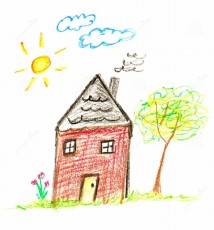ADULT CHILDREN OF ALCOHOLiCS & DYSFUNCTIONAL FAMILIES

Even as an adult, Calvin had always appraised himself as a “normal” person from a “normal” Midwestern family. He had two parents, a brother and a sister, a dog, and a house with a picket fence. His dad owned his own carpentry business while his mom worked as a secretary for a local legal practice. And yet, while all of that was true on the outside, inside the walls of his boyhood home things had often been unpredictable and downright chaotic. Though most people never knew it, Calvin’s father drank heavily and was always behind on various jobs, making the family consistently behind on their financial obligations. His mom hadn’t actually worked until high school, at which time his father’s drinking grew so bad he’d miss entire work weeks while Calvin’s mother called clients to beg for more time. Calvin’s father missed most all of his high school sporting events as well, failing to make good on his promises to be present. But of course, Calvin’s mom covered for him there as well. When he was recently asked to explain why he chose to become a financial planner and all of this came spilling out, he began to think that the helplessness and chaos he experienced growing up was anything but normal.
In spite of his successes in the business world, Kirk had always been plagued by nagging self-doubt and harsh self-judgment. As a result, his relational life was plagued with feelings of isolation and loneliness, and corresponding constant seeking of approval and affirmation. What’s more, he seemed only to date women who were likely to abandon him, and the closer they got to doing so, the tighter he clung to them until they had to end the relationship practically for their own survival. Kirk regularly and unnecessarily lied about all of this to friends who could plainly see what was happening, but were at a loss as to how to help him. When confronted, Kirk denied his role in his relationship cycles, but did concede that he didn’t have much of a framework for what relationships were supposed to look like having grown up in an alcoholic home.

Adult Children of Alcoholics.
Adult Children of Alcoholics is a widely recognized name for persons who grew up in a home with one or more alcoholics as parents. The term alcoholic parent in this sense generally refers to any pattern of drinking, particularly excessive, that interrupts a parent’s functioning across the lines of physical health, social/relational/spiritual functioning, and/or economic stability.
St. Louis Counseling for Adult Children of Alcoholics if available today! Start by making this simple call.
1-877-5-CHANGE (1-877-524-2643)!
Nervous about calling?
Email us at contact@changeincorporated.org!

St. Louis Adult Children of Alcoholics are often surprised to find how how much they have in common with others, particularly because they often experience feelings of isolation and aloneness. Here are some phenomena they tend to hold in common regarding the homes in which they grew up:
- Bearing Multiple Burdens:
- Caring for the alcoholic parent, helping them to get assistance/treatment, and of dealing with the fallout of the alcoholic parent’s actions on the family and themselves
- Common Family Feelings:
- A distinct and palpable feeling of hopelessness
- A genuine sense of confusion
- Fear and insecurity on multiple levels both toward the alcoholic parent and regarding anyone “finding out” what’s really going on
- Feelings of guilt
- Self-pity
- The family also usually experiences intense anger and resentment because of:
- Financial insecurity due to job loss as a result of alcoholic behaviors (missing days of work, poor performance or output levels, drinking while on the job, etc.)
- Broken promises
- In particular for older children, there is often a distinct sense of confusion over roles due to instability and unpredictability:
- Older children may be required to excessively care take for younger siblings
- Children may feel excessive worry and concern for parents, instead of the other way around
- Children may become “spousified” – i.e., they fulfill the emotional or practical needs that would normally be filled by the spouse who is alcoholic, becoming a surrogate spouse
- Excessive parental fighting
- Dr. Jekyll/Mr. Hyde mood fluctuations in the alcoholic parent
- Excuse-making and enabling behavior is a regular part of the family narrative
- Children often fantasize about running away or being adopted and taken away by friends or family members
- Children and non-alcoholic parents alike fear “outing” the alcoholic parent, and may find it difficult to express their feelings even when directly solicited
1-877-5-CHANGE (1-877-524-2643)!
Nervous about calling?
Email us at contact@changeincorporated.org!
Long-lasting Effects:
Even as adults, children of alcoholics often experience ongoing problems that are directly correlated to their experience within their families of origin and their interactions with their alcoholic parents. Here are a few of the most common experiences that last well into adulthood:
- Self-esteem problems, some of which may be masked by more external successes in business or academics
- A distinct feeling that they have little or no framework upon which to build a normal, happy family and relational life
- Inability to express feelings
- Struggles to build and/or maintain healthy relationships with friends, potential mates, spouses, or family
- Feelings of being loneliness or isolation, even when spending time with others
- Neediness, clinginess, and approval/affirmation addictions
- Excessive tendencies toward and/or emphasis upon responsibility, resulting in excessive rigidity surrounding rules, or drivenness toward success
- Irresponsibility
- Extremely self-critical or judgmental
- Pathological or unnecessary lying
- Misdirected loyalty, or continued loyalty to persons or situations that are destructive
- Difficulty with impulse control – acting without thinking
- Failure to effectively care for themselves
- Marrying/dating persons who abuse substances, or abusing substances themselves
Some Things You Should Know:
In the days of Oprah and Dr. Phil, we often shake our heads at how frequently people seem to jump on the bandwagon to blame their parents for everything. We understand dismay with that kind of behavior. Yet, honestly thinking through the impact of a childhood spent in an alcoholic home is a worthwhile venture. The goal isn’t to assign blame per se, but to lay out the various puzzle pieces that comprise our lives and make sense of them, in the hopes that they will one day resemble the picture we truly desire.
Here are some basic principles that you should know to help get you started:
- One: When we’re children, we tend to think the whole world revolves around us. As a result, we accept more than our fair share of responsibility in the difficulties our families face. The truth is, when those who are charged with our care fail in a way that is substantial, it’s not our fault. Period. It’s not your fault.
- Two: Our accomplishments may mask how much we’re struggling now. We may look at our successes in career, academia, or other areas and say to ourselves, “I’m fine – look at all I’ve done!” This is true on one hand – our accomplishments are worth celebrating. But, just as when we were children, just because things look okay on the outside doesn’t mean we’re not crumbling within. A big first step in lasting healing is to admit that our exterior and interior lives don’t match up.
- Three: The patterns of alcoholic homes often repeat themselves, even when alcohol is not directly involved. Adult children of alcoholics often swear-off drinking altogether, or limit it strictly to once or twice a year or at social gatherings only. But the patterns of emotional and relational instability tend to show up anyhow, because our parent’s alcoholism was only part of the problem. We often find ourselves recreating the same kinds of scenarios in our adult relationships, even when alcohol isn’t a factor.

The great news for adult children of alcoholics is that they don’t have to continue suffering, even though some of the helplessness they learned growing up may tell them other wise. Here are a few principles they can try on their own that are likely to provide relief.
- Get educated. It is extremely helpful to take classes or read books about relationships. Perhaps counterintuitively, adult children of alcoholics often make great students of human relationships, and the skills and techniques to interact within them comfortably and healthily.
- Introspect with someone’s help. Find a trusted friend, mentor, or guide to help you become more aware of your own responses, and allow them to give you honest feedback. The “trust” factor is key to your success, as it will enable you to communicate more honestly, and to receive constructive criticism more readily. Your trust in them will also be key when they balance out some of your self-criticism by praising your strengths telling you when you’re evaluating yourself too harshly.
- Build on your strengths. Adult children of alcoholics are often successful in many areas of life, so take cues from where you do well and begin to apply them in your interpersonal life. Take time to reward yourself for your accomplishments, receive genuine praise from others, become socially active, and consider the consequences of your actions in your personal life as much as you do in career or academic contexts.
- Join a support group. More than ever before, there is group support for adult children of alcoholics. Consider attending one of these:
Looking for Help for Adult Children of Alcoholics in St. Louis?
Message Us at contact@changeincorporated.org
Or use the form below — there’s no pressure.
Call Us
(314) 669-6242
ST. LOUIS COunseling Locations
NOW IN ONE EXPANDED & IMPROVED LOCATION TO SERVE YOU BETTER!
Change, Inc. South Hampton & 44:
3460 Hampton Avenue, Suite 204
St. Louis, MO 63139
PHONE/EMAIL HOURS:
Monday through Friday // 9a to 3p
Saturday // 12p to 3p
Contacts received before 3pm:
- returned the same business day
Contacts received after 3pm or on the Sundays:
- returned the next business day
314-669-6242 / 877-5-CHANGE (524-2643)
contact@changeincorporated.org
COUNSELING HOURS
7 DAYS PER WEEK:
10am to 9pm


